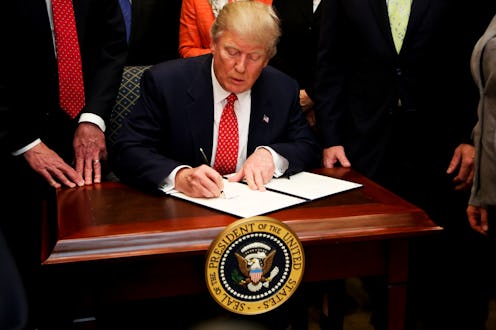News
Here's How The New Travel Ban Is Different

On Monday March 6, President Trump signed a new travel ban targeting six predominantly Muslim nations. Exactly one month prior, the president's initial controversial travel ban on seven Muslim-majority countries was halted by federal Judge James Robart. Days later, the suspension was upheld by a U.S. appeals court after the Trump camp disputed the judge's decision.
The new version, titled "Executive Order Protecting The Nation From Foreign Terrorist Entry Into The United States," has a few key differences to the original. During his Feb. 16 press conference, the president stated that the second rendering of his travel ban would be adjusted in accordance with the court's ruling. "The new order is going to be very much tailored to what I consider to be a very bad decision," he said.
Perhaps the most noticeable difference between the original order and the newly-signed one is the removal of Iraq from the list of countries included in the ban. The six remaining nations are Syria, Iran, Libya, Yemen, Sudan, and Somalia. This alteration is explained as such in the order's text: "The close cooperative relationship between the United States and the democratically elected Iraqi government, the strong United States diplomatic presence in Iraq, the significant presence of United States forces in Iraq, and Iraq's commitment to combat ISIS justify different treatment for Iraq."
Another crucial change to the updated order is an added list of exceptions. The version signed by the president on Jan. 30 did not exempt green card holders, dual citizens, visa holders, or refugees who'd already been approved for a new life in the U.S.
The Trump administration's new mandate specifically excludes permanent residents; foreign nationals who are "admitted to or paroled into" the U.S.; dual citizens who don't have passports issued by non-designated countries; foreign nationals with a document other than a visa "such as an advance parole document;" foreign nationals with diplomatic or "diplomatic-type" visas; and refugees who've already been approved for U.S. entry, who are already residing in the U.S., or who have been granted " withholding of removal, advance parole, or protection under the Convention Against Torture."
Unlike the order signed in late January, which was enacted immediately, the updated decree will take effect on Mar. 16, 10 days following its signing.
Other than practical differences between the two orders, the latest version also includes lengthy explanations for the inclusion of each of the six countries included in the ban. A lengthy paragraph insisting that religion is not the basis of the order has also been added.
(iv) Executive Order 13769 did not provide a basis for discriminating for or against members of any particular religion. While that order allowed for prioritization of refugee claims from members of persecuted religious minority groups, that priority applied to refugees from every nation, including those in which Islam is a minority religion, and it applied to minority sects within a religion. That order was not motivated by animus toward any religion, but was instead intended to protect the ability of religious minorities -- whoever they are and wherever they reside -- to avail themselves of the USRAP in light of their particular challenges and circumstances.
Many details remain the same, however, including the lengths of the ban and the actions expected afterward. A 90-day ban on all visitors who don't fall under the exempt categories listed in the order will still be implemented, along with a 120-day suspension of the U.S. Refugee Admissions Program. During these time periods, several members of the president's cabinet — specifically Secretary of State Rex Tillerson, Secretary of Homeland Security John Kelly, and the Director of National Intelligence (Trump's nominee, Dan Coats, has yet to be confirmed) — will review current procedures and policies and then advise the president on what permanent measures should be taken.
The American Civil Liberties Union has already vowed to challenge the new order. "Freedom of religion is enshrined in our Constitution and this new ban is still unconstitutional," read a tweet sent out in the organization's official account. "We will confront this revised order in our ongoing litigation against the ban."